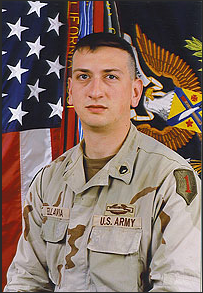In the most harrowing days of the Iraq War, one Army noncommissioned officer distinguished himself when he rescued an infantry squad pinned down by machine gun fire as they went door-to-door clearing insurgent strongholds.
That battle, on Nov. 10, 2004, made former Staff Sgt. David Bellavia the Iraq War’s first living recipient of the military’s highest award for valor, bestowed by President Trump on Tuesday at a White House ceremony.
“America’s blessed with the heroes and great people, like Staff Sgt. Bellavia, whose intrepid spirit and unwavering resolve defeats our enemies, protects our freedoms and defends our great American flag," Trump said. "David, today we honor your extraordinary courage, we salute your selfless service and we thank you for carrying on the legacy of American valor that has always made our blessed nation the strongest and mightiest anywhere in the world ? and we’re doing better today than we have ever done.”
Bellavia’s A Company, 2nd Battalion, 2nd Infantry Regiment, 3rd Brigade Combat Team, 1st Infantry Division, was in the midst of the weeks-long Operation Phantom Fury, also known as the second Battle of Fallujah. “The first thing you’re thinking about is, I mean, you’re scared,” he told reporters Monday. “Your life is on the line. The second thing you’re thinking about is, you’re angry. How dare anyone try to hurt us? How dare you try to step up against the United States military?”
On Nov. 9, his battalion’s top enlisted leader, Command Sgt. Maj. Steven Faulkenburg, died in a direct-fire attack.
“But the other thing is, you have people that they day before, risked their life to save you,” Bellavia said. “You have people the following two days would risk their lives to save you. And you have people within 24 hours who are killed in direct fire attacks that are your senior leadership.”
On Nov. 13, company commander Capt. Sean Sims was killed by small-arms fire during another mission to clear buildings. Their families joined Bellavia’s at the ceremony Tuesday, along with three others killed during the operation. All of that pushed him to step up in the moment, he said, when he had the choice to either wait outside the building for back-up, or go in again and take on the half-dozen insurgents he knew were inside. “What he did, going back into that nightmare, saved all those men’s lives,” journalist Michael Ware, who was embedded with the unit while writing for Time Magazine, told reporters.
Bellavia credited Ware, whom he previously considered a nuisance, with giving him the confidence to take on the house alone. “Peer pressure might make you smoke cigarettes when you’re 13, but peer pressure might also make you do things you wouldn’t do,” he said. “It’s who your peers are.”
Bellavia was nominated for the Medal of Honor in early 2005, his former company commander told reporters, but it was downgraded to a Silver Star. Then, seven months ago, Trump called him to let him know an upgrade had come through ? the result of a Defense Department-mandated review of Global War on Terror valor awards.
“For 15 years, people that heard about Fallujah or heard about Baqubah…now, they look into this unit, they look into what happened, what we did,” he said. “This is a snapshot of our year. And now they look back and say, wow, there were examples every single day of what people are sacrificing for this way of life.”
Reflecting on the recent 75th anniversary of D Day, he made a plug for his own peer group. “This is an all-volunteer force…college debt repayment, a dental plan, a paycheck? There’s no reason that a rational person is paying off college to clear a road with IEDs. We are not kicking down doors because we want to make sure we get paid on the first and the 15th,” he said. “That is what has kept this country free and it’s why we’re going to be safe for generations to come. "I think of that generation and the Iraq War and I’m mighty proud to be part of it.”
Article from the Army Times


No comments:
Post a Comment
Enter your Comments below. Keep it clean.